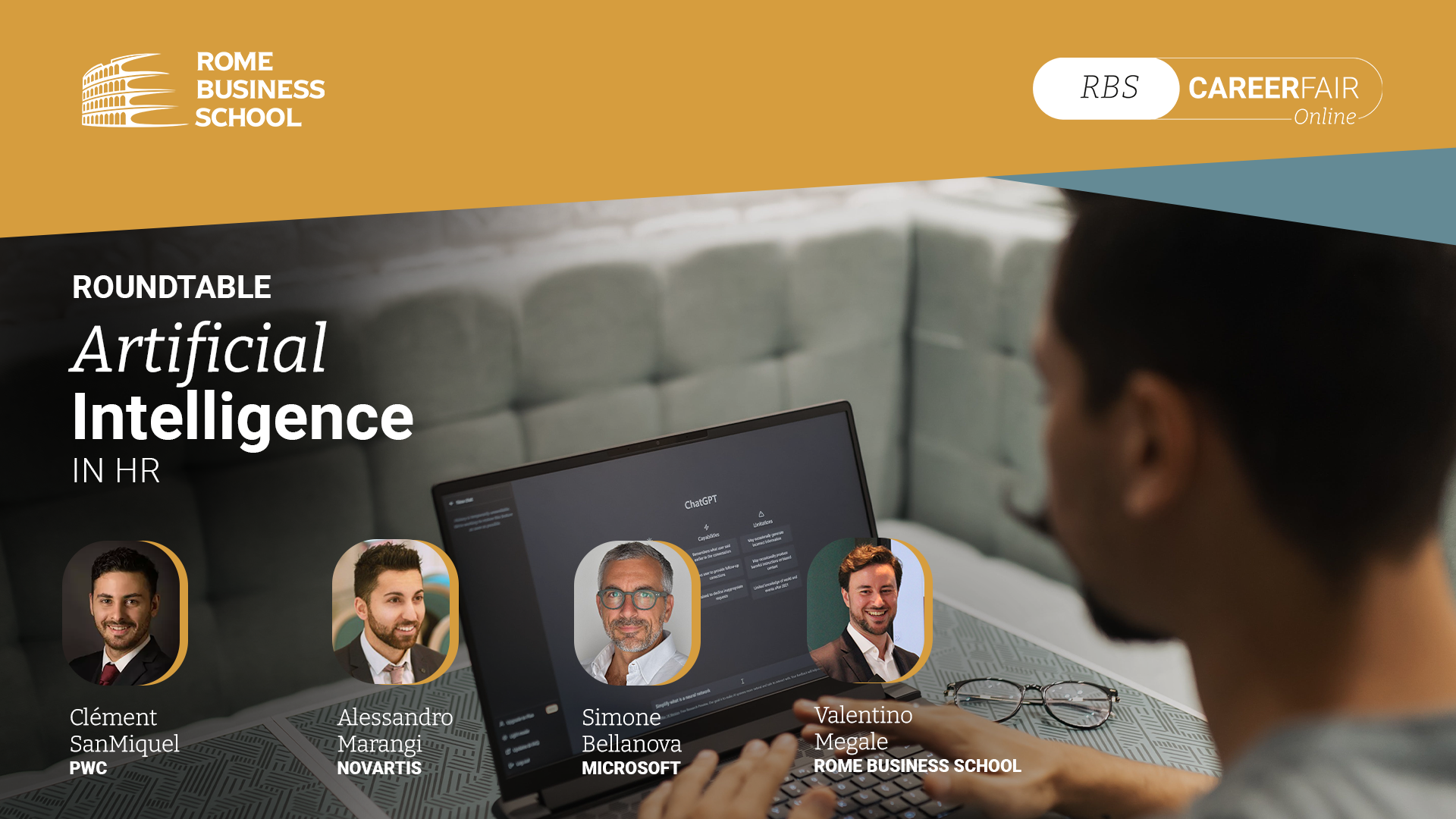Navigating the AI Revolution in HR: Guest Speakers from Microsoft, PwC, and Novartis Share Their Insights
Explore the topics discussed at the Rome Business School Online Career Fair 2023
Introduction
The roundtable on ‘Artificial Intelligence in HR’ was a highlight of the Rome Business School Online Career Fair, designed to offer valuable insights into future trends, social impact, and more. As part of the special events within the career fair, this roundtable brought together industry leaders and experts to discuss the profound impact of artificial intelligence (AI) on businesses. Massimo Scarcello, the Academic Director of Rome Business School, set the stage for the discussion by emphasizing the crucial need for companies to integrate AI into their strategic plans. Scarcello highlighted the upcoming EU AI Act, underlining its diverse regulations based on risk levels and its far-reaching implications for students and managers alike.
Leveraging Opportunities and Minimizing Risks of AI
Valentino Megale, Professor at Rome Business School, took the stage to discuss the vast potential of AI in leveraging opportunities and minimizing risks, particularly in the human resources (HR) sector. Referring to Goldman Sachs’ projection that 300 million jobs will be impacted by AI, Megale pointed out the critical role HR professionals would play in this transformative era.
Insights from Industry Leaders
Clement SanMiquel – Talent Acquisition Expert at PwC Canada
Celebrating ChatGPT’s recent birthday, Clement SanMiquel, Talent Acquisition Expert at PwC Canada, highlighted its rapid growth and powerful capabilities. He expressed gratitude for being part of a generation witnessing a transformative era where AI acts as a valuable assistant in decision-making processes.
Alessandro Marangi – Senior Talent Acquisition Partner EMEA at Novartis
Alessandro Marangi, Senior Talent Acquisition Partner EMEA at Novartis, delved into the significant impact of AI on HR processes. He discussed areas like candidate sourcing, video interview analysis, and the importance of adapting CVs to align with AI-driven keyword filters. Marangi emphasized key focus points such as pre-employment assessments and bias reduction.
Simone Bellanova – Managing Director Business Application | Germany, Switzerland, and Manufacturing EMEA at Microsoft
Simone Bellanova, Managing Director Business Application | Germany, Switzerland, and Manufacturing EMEA at Microsoft, shared his one-year experience at Microsoft. He illustrated the revolutionary changes AI brought to their recruitment processes, emphasizing the efficiency gains and time reduction achieved through AI in hiring and employee performance evaluation.
Transparency in AI Implementation
Addressing concerns about data transparency, the speakers provided valuable insights on ethical considerations. Clement SanMiquel cautioned against using all available AI tools without careful consideration of where candidate data is stored. Alessandro Marangi presented a comprehensive approach to ensure transparency, including establishing clear objectives, educating and training employees, and communicating both benefits and limitations. Simone Bellanova touched upon the challenges posed by data storage, particularly in compliance with GDPR. Moreover moving forward it’s important to have clear communication about AI’s role in recruitment, ensuring transparency and trust in the process.
Ensuring Bias-Free Artificial Intelligence in HR
Conducting Regular Audits
Speakers delved into the importance of conducting regular audits of AI algorithms to prevent biases, promoting fair and unbiased decision-making.
Promoting Diversity and Inclusion
The role of AI in promoting diversity and inclusion is crucial, the use of diverse datasets can foster a more inclusive workplace.
Future AI Innovations in HR
Some practical examples of how AI can be used in Human Resources
- Leveraging Predictive Analytics
- Exploring AI for Employee Engagement
- Personalized career development for employee satisfaction
- Identifying High-Potential Employees
- Pinpointing Skills Gaps with AI
The AI Revolution
The roundtable served as a platform for rich discussions on the transformative impact of AI on HR processes. From leveraging opportunities to minimizing risks and ensuring transparency, the insights from industry leaders shed light on the evolving landscape where AI is reshaping the way organizations operate. As businesses continue to adapt to the AI revolution, the key lies in embracing innovation while upholding ethical standards and transparency.
Want to learn more about the topic? Discover our International Master in Artificial Intelligence




